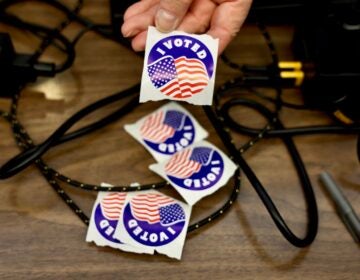Concerns over conflicts of interest arise over move to redraw Pa. maps
The ruling creates a rare question for members who are currently running for Congress: is it appropriate for them to help fix the maps or vote on the new ones?
In the wake of the Pennsylvania Supreme Court’s decision to declare the state’s congressional maps unconstitutional, lawmakers are starting the redrawing process before the February 15th deadline.
The ruling creates a rare question for members who are currently running for Congress: is it appropriate for them to help fix the maps or vote on the new ones?
Art Halvorson, a Republican who’s launching his fourth run for the soon-to-be-vacant 9th Congressional District, thinks not.
He’s up against House Majority Leader Dave Reed and Senator John Eichelberger, both Indiana County Republicans.
“Mr. Reed and Mr. Eichelberger, you need to recuse yourselves from any process that would involve your participation in the redrawing of the 9th District lines,” Halverson demanded at a public forum.
The process of redrawing congressional maps is designed to give all members of the legislature a say, which means Reed and Eichelberger would certainly be participants under normal circumstances.
As a caucus leader, Reed in particular would have a key role in shaping the new districts.
But now, Reed’s spokesman Steve Miskin said the majority leader won’t take part in the drawing process.
“He is taking a step back to avoid any possible, even discussion of a conflict,” Miskin said.
That doesn’t mean Reed — or Eichelberger — won’t vote on the finished maps, though.
The House and Senate both have a process for lawmakers to ask their chamber secretaries and presiding officers to rule whether they have conflicts of interest that should keep them from voting.
In the Senate’s case, the presiding officer is Democratic Lieutenant Governor Mike Stack.
His spokesman, J.P. Kurish, said this potential conflict is unprecedented — and particularly tricky.
“The problem, I would guess, is who judges whether a certain map benefits a person or doesn’t?” he said.
Even for more run-of-the-mill questions, Kurish said the chambers rarely rule that members can’t vote.
Miskin said that’s because typically, the vote in question isn’t specific enough to constitute a conflict.
For instance, in this case, he said the vote “is a statewide thing … you’re not just voting for Congressional District 1 or Congressional District 2 — you’re voting for the Pennsylvania maps.”
Neither Eichelberger nor Reed has filed a ruling request with their chambers — but Eichelberger said he does intend to do so.
There are a few conditions under which the legislature’s redrawing process would become a nonissue: if the senate’s appeal to the US Supreme Court prompts a stay on the state court’s ruling; or if the lawmakers miss their deadline, which would mean the state court will choose a new map.
WHYY is your source for fact-based, in-depth journalism and information. As a nonprofit organization, we rely on financial support from readers like you. Please give today.





